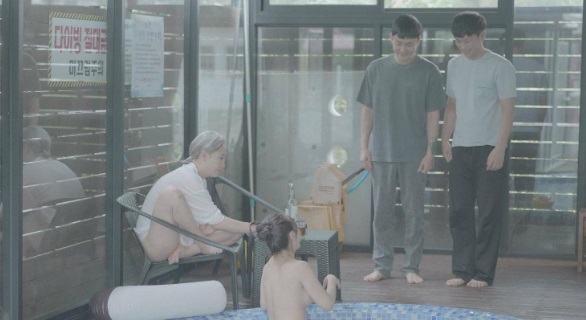
New Korean Porn Overflowing Sisters, directed by Kim Do-hyun-V. We are invited into a story that blends tension, hidden emotions, and complex relationships within a short 88-minute runtime. Set in South Korea, this erotic drama unravels in a guesthouse where two sisters share a fleeting yet emotionally charged evening with two male hostesses. On the surface, the sisters appear to be indulging in a casual encounter, but beneath the pleasantries lies a web of unspoken desires and unresolved feelings. Each sister harbors different emotions that create underlying tension, which ultimately colors the tone of the entire narrative.
Plot Summary
The story follows two sisters who, seeking an escape or simply a change of pace, find themselves in a guesthouse. There, they invite two male hostesses to join them for the night. The interactions between the sisters and the men begin playfully, and the dynamic seems casual. However, as the night unfolds, viewers quickly realize that the bonds between these four individuals aren’t as lighthearted as they appear. Each character seems to navigate through a series of masked emotions, hinting at unresolved issues and hidden motives. What initially seems like a simple, uninhibited night soon transforms into a suspenseful and emotionally charged exchange where the true nature of each character is gradually revealed.
Characters and Performances
So Jeong and Jin Seo-yool portray the two sisters, offering performances that hinge on subtle gestures and unspoken tension. Their characters display a remarkable depth, especially as the story reveals their inner struggles. So Jeong’s portrayal brings out a sense of restraint, which hints at a reserved and possibly repressed character who is likely battling internal conflicts. Jin Seo-yool’s role, on the other hand, contrasts this by giving us glimpses of impulsiveness and perhaps a slightly more vulnerable side. Together, the actresses craft a believable sibling relationship, one that feels tense, complex, and often reflective of the love-hate dynamics present in family ties. Their portrayals are nuanced and highlight how family bonds can sometimes blur the lines between love, jealousy, and rivalry.
The male hostesses, portrayed by Joong In and Lee Do-jin, bring a contrasting energy to the film. Their roles add layers to the plot by serving as foils to the sisters, allowing the audience to see different sides of each character as they react to the men’s presence. Joong In’s character offers an intriguing mixture of charm and mystery. His portrayal keeps viewers guessing about his true motives and emotions. Lee Do-jin, meanwhile, adopts a more grounded approach, which complements Joong In’s energy and adds stability to the scenes, allowing the more emotionally turbulent sisters to stand out.
Themes and Symbolism
At the heart of Overflowing Sisters lies an exploration of the complexities in relationships, both familial and romantic. The story subtly examines how love can blur boundaries and create emotional conflicts, especially within a family. The sisters’ relationship is portrayed as intricate and layered with emotions ranging from affection to jealousy. The presence of the two male hostesses complicates this further, creating a setting that exposes the characters’ vulnerabilities and hidden desires.
The guesthouse itself acts as a symbolic space where normal societal boundaries and expectations are suspended. It allows the characters to explore themselves in ways they might not otherwise. This confined space intensifies their emotions, bringing to the forefront the things they have hidden even from themselves. This setting serves to isolate the characters from the outside world, making the viewer feel as though they’re privy to a secret, intimate interaction. This intimacy also helps reinforce the themes of secrecy, revelation, and self-discovery.
Cinematic Style and Direction
Director Kim Do-hyun-V approaches the material with a mix of subtlety and intensity. He uses close-up shots to emphasize the quiet, often unspoken tension between characters, capturing the micro-expressions that reveal their true feelings. The restrained use of music allows for a greater focus on the dialogue and the actors’ performances, which helps establish an atmosphere of unease and anticipation. Each shot feels deliberate, emphasizing the confined nature of the guesthouse and the trapped feelings of each character. This stylistic choice enhances the film’s emotional weight and gives the audience an intimate look into the characters’ psyche.
The pacing of the film is deliberately slow, allowing the tension to build gradually. Rather than relying on dramatic events to move the story forward, the director focuses on building emotional intensity. This slow-burn approach may appeal to viewers who appreciate character-driven stories, although it may feel sluggish for those looking for a faster, more action-packed narrative.
Social Commentary and Cultural Reflection
While Overflowing Sisters primarily functions as an erotic drama, it subtly delves into social themes relevant to modern South Korean culture, including the pressures of family expectations and the taboo surrounding personal desires. The sisters’ interactions highlight the ways in which societal expectations can shape individuals’ relationships and influence their choices. Their conflicting feelings for each other and for the men could reflect the emotional and psychological toll that such social pressures can exert on a person, even when they appear to be “having fun” or acting freely.
Additionally, the film addresses gender roles and the evolving perspectives on relationships and sexuality in contemporary South Korea. By placing women in control of the interactions and exploring their desires and inner conflicts, Overflowing Sisters challenges traditional gender dynamics, offering a more progressive take on women’s autonomy in their relationships and choices. The portrayal of the sisters as multifaceted individuals with complex emotions stands in contrast to the often simplistic depictions of women in traditional cinema.
Strengths and Weaknesses
One of the film’s strengths is its ability to build suspense through subtle interactions. The actors’ performances, combined with Kim Do-hyun-V’s restrained direction, create an atmosphere that is as intriguing as it is unsettling. The emotional depth of the sisters’ relationship is particularly compelling, giving the audience insight into the hidden layers of their characters.
However, the film’s slow pacing might be a drawback for some viewers. While the intentional pace helps to develop the tension, it can also feel drawn-out, especially for those who prefer more event-driven narratives. Additionally, some viewers might find the film’s open-ended approach to its themes frustrating, as it leaves certain questions unresolved. The characters’ motivations and true feelings are hinted at but never fully explored, which could leave some feeling unsatisfied by the end.
Conclusion
Overflowing Sisters is a contemplative drama that delves into complex emotional landscapes with a subtle yet provocative approach. Director Kim Do-hyun-V uses careful cinematography and restrained pacing to create an atmosphere of intimacy and tension, drawing viewers into the characters’ world and encouraging them to reflect on the dynamics of love, jealousy, and desire. The performances of So Jeong, Jin Seo-yool, Joong In, and Lee Do-jin elevate the film, adding layers to a story that could otherwise seem simple.
This film is likely to resonate with audiences who enjoy character-driven stories and are open to exploring the deeper, often messy aspects of human relationships. While it may not appeal to those seeking a fast-paced or action-oriented film, Overflowing Sisters offers a thoughtful look at the emotions that simmer beneath the surface in relationships, making it a compelling watch for fans of introspective and emotionally charged dramas.
